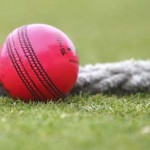Kent’s final LV County Championship fixture of the season against Glamorgan will be played as a day-night match, with a pink ball, after a request from the ECB.
The game, due to start at the St Lawrence Ground, Canterbury on Monday 12 September, would move to a 2pm start instead of 10.30am, with the scheduled finish at 9pm.
Kent have agreed to play the match under floodlights with players still playing in whites with the floodlights coming on at 5:30pm each day or earlier if the natural light deteriorates.
MCC has been at the forefront of developing pink ball, day-night, first-class cricket since 2008 with the aim of developing a format suitable for Test cricket.
For the past two seasons the traditional season curtain opener, the MCC v Champion County match, has been relocated from Lord’s to Abu Dhabi in order to further these trials.
Both the ICC and the ECB have expressed their support towards the idea of playing day-night Test cricket, with the pink ball currently the most viable option.
Pink balls were first used at Lord’s in 2008 As well as MCC’s two fixtures in Abu Dhabi, a pink ball has also been used in first-class matches in Pakistan and the West Indies.
MCC Head of Cricket John Stephenson said: “MCC is delighted that the ECB has taken this step to further the trials of pink ball, in first-class cricket.
“The Club, driven by the work of the MCC World Committee, has invested a lot of time and energy in creating a formula which is suitable for using in Test cricket in the future.
“We also appreciate the need for trials in as many different playing conditions as possible, and the prospect of first- class cricket for the first time in England is an excellent development.”
Pink balls have been used in matches in England before, with Stephenson himself captaining MCC in a trial match against Scotland, at Lord’s in 2008.
Ball manufacturers, including Kookaburra, Dukes, and LVCC division ball makers Tiflex have sought to develop a ball capable of lasting 90 overs – essential for the rigors of Test cricket.
The WCC, a collection of former international cricketers, administrators and umpires, has sat twice a year since 2006.
It has put forward several suggestions for reinvigorating Test cricket, particularly in countries where attendances are in decline.
The WCC sees day-night Test cricket as something which can help to keep Test cricket as the pinnacle of the international game throughout cricket-playing nations.





